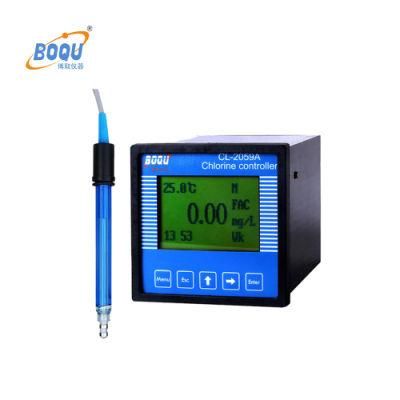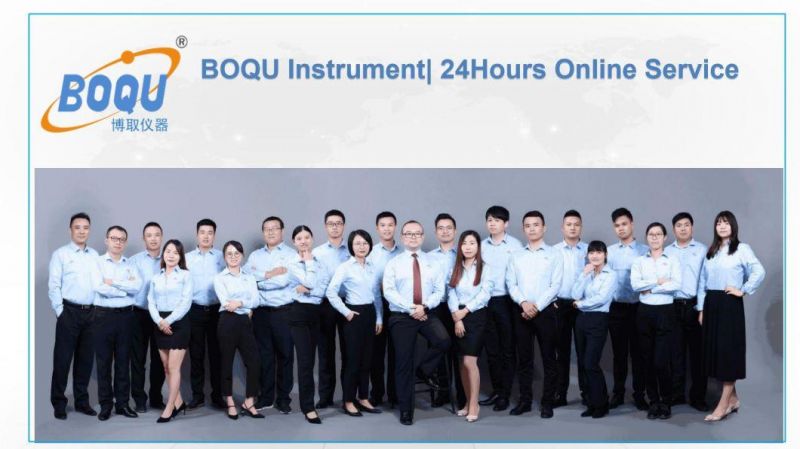
Boqu Cl-2059A RS485 and 4-20mA Output Residual Chlorine Measurement Analyzer
Shanghai Boqu Instrument Co., Ltd.- After-sales Service:10 Engineers in After Service Department
- Warranty:1 Year
- Display:Digital
- Appliance:Food Analysis, Medical Research, Biochemistry
- Portable:Non Portable
- Certification:RoHS, FCC, CE, ISO9001
Base Info
- Model NO.:CL-2059A Online Residual Chlorine Meter
- Name:Cl-2059A Online Residual Chlorine Meter
- Residual Chlorine:0~20mg,L
- Power:220VAC or 24VDC
- Communication:RS485 Modbus
- Output:4-20mA
- Relays:2 Relays
- Application:Swimming Pool,Drinking Water,Hospital,Power Plant
- Brand Name:Boqu Instrument
- Transport Package:Quality Package for International Transport
- Specification:BOQU Instrument production over 100 000pcs,year
- Trademark:BOQU
- Origin:China
- HS Code:9027809990
- Production Capacity:100000PCS,Year
Description
Overview
Detailed Photos
1. Water quality analyzer and sensor expert 2. The factory was established in 2007.3. 2 The factory is in Shanghai China.4. Annual production capacity: 100 0000pcs5. Found 2 factories in Shanghai China.6. The total plant area: 3200m27. The total number of employees: 168 (2020) 8. Patent certificates: 23 certificates. 9. Software copyright: 2610. One-stop solution for water treatment analyzer
2. What is residual chlorine
Residual chlorine refers to the amount of chlorine remaining in the water after the water has been in contact with the chlorine disinfectant for a certain period of time. Usually expressed in ppm or mg/L units. There are three forms of residual chlorine: 1. Free residual chlorine: generally refers to hypochlorous acid (HOCl) and hypochlorite (OCl-), also known as free chlorine.
3. Why should chlorine be added to tap water?
Tap water should be a kind of sanitary and safe drinking water, but due to environmental pollution, bacteria and other harmful substances in the water multiply. In order to resist and kill bacteria in the water, chlorine is added to the water treatment process.
4. What are the hazards of bathing with water containing residual chlorine for a long time:
Bathe with tap water containing residual chlorine. 40% of the total chlorine in the bathroom is inhaled through the respiratory tract, and 30% is absorbed by the skin, which is 6-8 times the amount of chlorine that enters the body through drinking. Mild cases may cause itching, which will accumulate over time. The carcinogenicity rate in middle age will increase by 30%.
5. Does Boqu instrument support installation qualification?
Yes, we provide professional installation, certification, and calibration services. These services will ensure accurate and precise measurement so that users have no worries when they encounter possible compliance issues during the quality audit.
BOQU Contact

Company Profile
BOQU Exhibition
Certifications
Visit Customers
FAQ
FAQ of r Pure water treatment and price best chlorine analyzer
1. Why choose Boqu Capital to control the working principle of the chlorine analyzer1. Water quality analyzer and sensor expert 2. The factory was established in 2007.3. 2 The factory is in Shanghai China.4. Annual production capacity: 100 0000pcs5. Found 2 factories in Shanghai China.6. The total plant area: 3200m27. The total number of employees: 168 (2020) 8. Patent certificates: 23 certificates. 9. Software copyright: 2610. One-stop solution for water treatment analyzer
2. What is residual chlorine
Residual chlorine refers to the amount of chlorine remaining in the water after the water has been in contact with the chlorine disinfectant for a certain period of time. Usually expressed in ppm or mg/L units. There are three forms of residual chlorine: 1. Free residual chlorine: generally refers to hypochlorous acid (HOCl) and hypochlorite (OCl-), also known as free chlorine.
3. Why should chlorine be added to tap water?
Tap water should be a kind of sanitary and safe drinking water, but due to environmental pollution, bacteria and other harmful substances in the water multiply. In order to resist and kill bacteria in the water, chlorine is added to the water treatment process.
4. What are the hazards of bathing with water containing residual chlorine for a long time:
Bathe with tap water containing residual chlorine. 40% of the total chlorine in the bathroom is inhaled through the respiratory tract, and 30% is absorbed by the skin, which is 6-8 times the amount of chlorine that enters the body through drinking. Mild cases may cause itching, which will accumulate over time. The carcinogenicity rate in middle age will increase by 30%.
5. Does Boqu instrument support installation qualification?
Yes, we provide professional installation, certification, and calibration services. These services will ensure accurate and precise measurement so that users have no worries when they encounter possible compliance issues during the quality audit.
